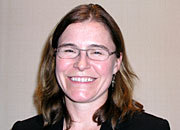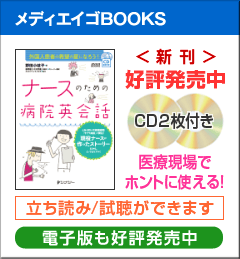インタビュー
「General Session III:胃・食道癌に対する集学的治療」の座長 Laura Dawson氏に聞く

胃・食道癌に対する集学的治療のセッションでは,化学療法,放射線療法,手術を組み合わせた最適な治療戦略について発表が行われた。胃・食道接合部腺癌では,術前の化学療法のみならず,放射線療法を組み合わせたより強力な治療を行うことに意義があるのかどうかが問われ,食道扁平上皮癌では,放射線化学療法に効果を認めた患者への手術の必要性の有無が議論された。さらに,進行胃癌に対する化学療法では,より多くの薬剤を併用することの是非について日本と韓国から第III相試験成績が発表され大きな関心を呼ぶなど,今,どのくらいの強度の治療を行うべきかが問題となっている。そこで,このセッションの座長であり,本学会のプログラム委員の一人でもある,カナダの放射線腫瘍医・Laura Dawson氏(プリンセス・マーガレット病院)に,これからの胃・食道癌の治療戦略の方向性について話を聞いた。
| 編集部 | このセッションでは,胃・食道癌の患者に対し,どの程度強力な治療が必要なのか,多岐にわたる問題が討議されました。先生は,今後,これらの患者に対する治療戦略はどのような方向に進むとお考えですか? |
| Dawson氏 |
Get the Flash Player to see this player.
|
Download(クリックで保存) |
intensity:強度,程度
response:奏効,治療反応性
surrogates:代替指標(治療が効くかどうかを予測する指標)
I was one of the moderators for the last session, which involved multidisciplinary treatment for gastric and esophageal cancers. And the general theme was regarding what the optimal intensity and number of treatments are, for these cancers. In general, in past years, we've had many abstracts and studies suggesting that more treatment might improve survival. Today, the question was do we some... do we need to treat patients as... intensively. For example, one of the topics was for esophageal cancers, do patients who have a very good response to chemotherapy and radiation need to go ahead to have surgery which is still very common practice in North America. Similar for lower esophageal cancers of the gastroesophageal junction, same question came up. Not all patients need to have all treatments. Now, a challenge is deciding which patients need all treatments and which patients can do very well with less therapy. And from the last session, we don't yet have the markers or imaging studies to tell us exactly who does not need all treatments but there's lots of exciting research that probably in a few years, we will have better surrogates for patients, or surrogates for patients who are likely do better or do worse with therapy and that might help us decide who needs more therapy and who doesn't.
| 編集部 | 胃・食道癌の病態は非常に多様であり,また地域ごとの分布差もあると思いますが,よりよい治療を目指していく上で必要なことは何でしょうか? |
| Dawson氏 |
Get the Flash Player to see this player.
|
Download(クリックで保存) |
epidemiology:疫学(ここでは,胃・食道癌の組織型やその分布を指す)
gastrointestinal:消化器(胃・腸)の
representation:代表者,参加者
I am from Canada, so we all can learn from each other. Gastric cancers are much... and esophageal cancers are much more common in Asia and Japan with different epidemiology compared to cancers in North America, and so we need to learn from each other, even though the cancers may be a little bit different. I congratulate the Japanese investigators for completing a very good randomized trial. So I expect we all learn from each other and this is the kind of meeting actually, where that happens because it's very focused on one, one type of cancer, gastrointestinal cancers, where as you can see, there is international representation. So it's very nice.



